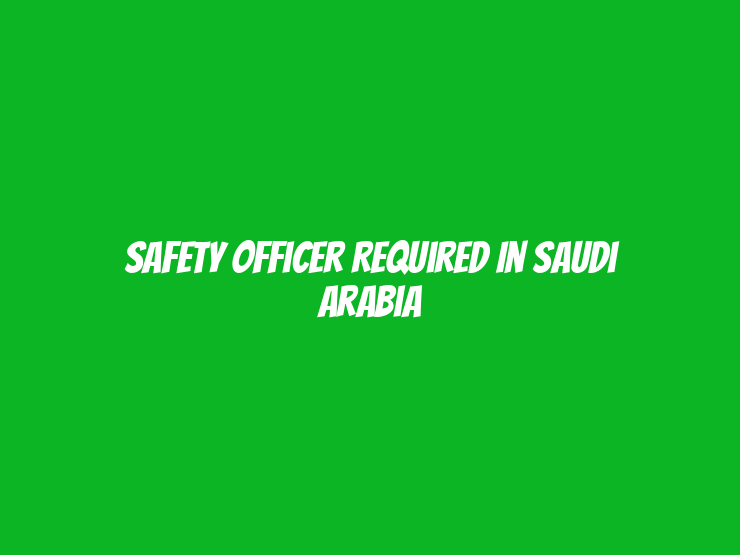A Safety Officer is a crucial role within any organization, responsible for ensuring a safe and healthy working environment. This role involves developing, implementing, and maintaining health and safety policies and procedures that comply with legal regulations and industry standards. Safety Officers play a key part in identifying potential hazards, conducting risk assessments, and providing training to employees on safe work practices. Their primary goal is to prevent workplace accidents, injuries, and occupational illnesses by fostering a culture of safety and continuous improvement. The Safety Officer works closely with management, employees, and external agencies to monitor and enhance safety protocols across all operational activities.
| Salary | Market Competitive |
| Experience | 5 – 10 years |
| Location | Saudi Arabia |
| Qualification | Any Graduation |
| Posted | 12 November 2024 |
| Job Type | Full Time |
| Posted by | Habeebi Recruiter |
| last date to apply | apply within 15 day |
Key Responsibilities
1. Development of Safety Policies and Procedures
Safety Officers are tasked with creating comprehensive safety policies and procedures tailored to the organization’s specific needs. They review current practices, conduct workplace inspections, and collaborate with management to develop guidelines that ensure compliance with local safety regulations and industry standards. These policies cover areas such as fire safety, hazardous material handling, and emergency preparedness. The Safety Officer ensures that these procedures are clearly documented and communicated to all staff members, providing a framework for safe and efficient operations.
2. Risk Assessment and Hazard Identification
A critical responsibility of the Safety Officer is to identify potential hazards in the workplace and conduct thorough risk assessments. They evaluate all aspects of the work environment, including equipment, processes, and employee behaviors, to detect risks that could lead to accidents or health issues. Safety Officers use various tools and methodologies to assess risks, such as safety audits, site inspections, and hazard analysis. Based on their findings, they develop strategies and recommend measures to eliminate or control risks, ensuring a safer working environment for all employees.
3. Conducting Safety Training and Awareness Programs
Safety Officers are responsible for organizing and conducting training sessions to educate employees about health and safety practices. These sessions cover topics like proper equipment use, emergency procedures, fire safety, and safe handling of hazardous substances. Safety training is tailored to different departments and job roles, ensuring that employees are well-equipped to handle potential risks. Through regular training and awareness programs, Safety Officers help instill a culture of safety, encouraging employees to be vigilant and proactive in preventing accidents.
4. Incident Investigation and Reporting
When workplace incidents or accidents occur, Safety Officers lead the investigation to determine the root cause and prevent recurrence. They gather information, interview witnesses, and analyze evidence to identify contributing factors. Following the investigation, Safety Officers prepare detailed reports, outlining their findings and recommending corrective actions. These reports are used to improve safety protocols and provide insights for future risk mitigation. The Safety Officer ensures that incidents are documented in compliance with regulatory requirements and that necessary follow-up actions are taken.
5. Monitoring Compliance and Regulatory Adherence
Safety Officers are responsible for ensuring that the organization adheres to all relevant health and safety regulations. They stay up-to-date with changes in local laws and industry standards, integrating these updates into the company’s safety policies. Regular audits and inspections are conducted to monitor compliance, and any violations are promptly addressed. Safety Officers also handle the preparation of necessary documentation for regulatory authorities, ensuring that the organization meets legal obligations. Their diligent oversight helps avoid legal issues, fines, and operational disruptions.
6. Emergency Preparedness and Response Planning
Part of the Safety Officer’s role involves developing and implementing emergency response plans. They assess the potential risks of fires, chemical spills, natural disasters, and other emergencies, creating procedures to handle these situations effectively. Safety Officers organize regular drills, such as fire evacuations, to test the readiness of employees and emergency response teams. They ensure that emergency equipment, such as fire extinguishers and first aid kits, is easily accessible and maintained properly. By preparing employees for emergency scenarios, Safety Officers help minimize harm and ensure a swift response in critical situations.
Skills and Qualifications
To succeed as a Safety Officer, candidates typically need a Bachelor’s degree in Occupational Health and Safety, Environmental Science, or a related field. Certifications such as the Occupational Health and Safety Administration (OSHA) certification or the NEBOSH International General Certificate are highly valued. Safety Officers should possess strong analytical skills, attention to detail, and the ability to handle stressful situations. Excellent communication and interpersonal skills are essential for conducting training and working with diverse teams. Previous experience in a safety-related role is often required, along with a solid understanding of safety regulations, risk assessment, and incident investigation techniques.
How to apply:
Send your updated resume to our email or directly reach us at our phone:
Email: info@zulufksa.com
Phone: +966 3 8971144, 8973757
Fax: +966 3 8973836

